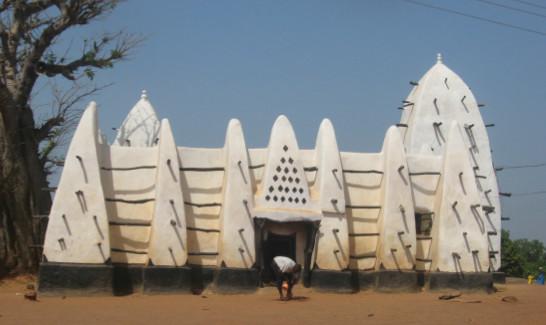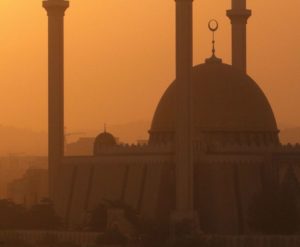Islam or Islams? Messiah or Immanuel?
In such challenging and confusing days of trying to understand Islam, John Azumah’s article is timely, eye opening, and thought provoking. Out of his African background and firsthand experience engaging with Muslims, he has a great deal to contribute to the various hotly debated matters concerning Islam and its history, legacy, and nature. I have greatly benefited from Azumah’s scholarship and have agreed with just about everything he teaches and writes. I had the privilege of listening to his lectures at the Arab Baptist Theological Seminary in Lebanon earlier this summer, where his unique level of academic prowess, theological acumen, pastoral qualities, and Christian character were evident in his lectures and interactions with those in attendance. I am thus grateful for this opportunity to interact with his article on “The Church and Islam in Africa”—an article that encapsulates a huge amount of research in a little space, providing historical, theological, and practical insights about Muslim-Christian interaction, with a special emphasis on Africa. I will briefly reflect on two major contributions of this article, followed by two questions that could be explored in a future publication.
 The first major contribution of this article is that Azumah not only identifies the multifaceted religious nature of the Muslim community but also its cultural diversity— thus offering a unique understanding of Islam and its diverse adherents. The worldwide Muslim umma (community) involves various cultures and different religious sects. In the post-9/11 world, common questions are being posed regarding the nature of Islam as a religion and the mindset of Muslims as a community; for example, Is Islam a violent religion? Does Islam instruct Muslims to kill non-Muslims everywhere? Does Islam encourage suicide bombing? Does Islam undermine women? And so forth. For all these questions, Azumah responds: which Islam are you talking about? In an excellent turn, he identifies several faces and various trends within Islam, using a better term: Islams. He explains the complex nature and connectedness between African Islam and African cultures, pointing out that “Islam in Africa is thoroughly Africanized.”
The first major contribution of this article is that Azumah not only identifies the multifaceted religious nature of the Muslim community but also its cultural diversity— thus offering a unique understanding of Islam and its diverse adherents. The worldwide Muslim umma (community) involves various cultures and different religious sects. In the post-9/11 world, common questions are being posed regarding the nature of Islam as a religion and the mindset of Muslims as a community; for example, Is Islam a violent religion? Does Islam instruct Muslims to kill non-Muslims everywhere? Does Islam encourage suicide bombing? Does Islam undermine women? And so forth. For all these questions, Azumah responds: which Islam are you talking about? In an excellent turn, he identifies several faces and various trends within Islam, using a better term: Islams. He explains the complex nature and connectedness between African Islam and African cultures, pointing out that “Islam in Africa is thoroughly Africanized.”
African culture is not homogeneous and neither is Islam—there are various cultures and multifaceted Islams. The obvious diversity among African countries results in diversity of cultures and, consequently, religious differences in doctrinal issues, theological interpretations, and matters of practice. The version of Islam we encounter in Egypt differs in various aspects from the one we see in Ghana. It is evident that culture influences the way religion is perceived and even practiced. The “theological” questions asked by a Ghanaian Muslim may differ from those posed by an Egyptian; moreover, the interpretation of some Qur’anic verses or hadiths can also vary as they will be encapsulated with cultural terms. Azumah is right in pointing out that “Islam in Africa is not only made up of different colors of the African soil, African Islam is made up of different threads, new and old, woven together into an African fabric.”
Christians seeking to apply insights from Azumah’s article will be challenged to cease stereotyping Muslims by placing them all in one category. Such stereotyping will only distance the church more and more from interacting with Islam and Muslims. Islam cannot be viewed as one monolithic religious system or coherent cultural body. For instance, in 2001, some “Muslims” planned the 9/11 attack, and some “Muslims” died as victims in it. One could argue that some militant “Muslims” planned and executed the attack, but still there are also many cultural, Qur’anic, and pious “Muslims” who condemned it. In Egypt, in different waves of sectarian violence, many Coptic Christians were killed by some people claiming to be “Muslims.” However, it should also be noted that other Egyptian “Muslims” decided to come sympathize with those heartbroken Christian families who lost loved ones. Azumah’s examination of the various faces of Islam is very helpful not only to avoid demonizing Muslims or Islam but also to show the strong connectedness between Islam as a religion and the culture in which it is embedded.
A second important contribution of Azumah’s article is that he offers a new hermeneutical framework to interact with and respond to Islam, namely, “Immanuelogy.” Africans would relate to the “Immanuel” idea or concept more than to “King of Kings” or “Messiah.” That is indeed a unique understanding that Azumah brings to help the contemporary church interact with Muslims in a Christlike way. In an excellent turn, Azumah suggests this model to respond to Islam specifically in sub-Saharan Africa. It seems, though, he excludes North Africa from this model as he is aware of the different nature of North African Islam—especially the version of Wahhabi and Salafi Islam found in Egypt. It rings true that this “Immanuelogy” hermeneutical framework would best fit a sub-Saharan African mindset and worldview. It speaks of Christlike living in an African context in a way that Africans would relate to the most, especially in dialoging with Muslims. Africans prefer the God who lives among them, eats with them, and feels with them; not the one who lives far away in an ivory palace that they hear about from a distance.
I still find this hermeneutical framework applicable and valid in other contexts. In fact, and speaking missiologically, I would argue that this model has much to say to various Christian groups in different contexts. I will mention only two. First, learning to engage with Muslims through an “Immanuel” model is greatly needed among non-African missionaries who have a heart to serve in Africa. These missionaries usually come to Africa with pre-prepared sets of solutions to “theological” debates either to present the gospel or to preach to African Muslims; they know how to defend their faith and how to show the possible flaws in Islam. However, these missionaries need to realize that African Muslims are Africans before they are Muslims. Muslims in Africa are influenced by relationships more than intellectual formulas and equations. They elevate honor and dignity above being theologically correct and accurate. They view the name of their family, ancestors, and tribe as much more important than their individual names. Simply put, they are Africans. This may be a major reason for the sharp dissonance between the versions of Islam we have in sub-Saharan Africa and those versions we encounter in places such as Saudi Arabia or Iraq. Islam succeeded in spreading to many places in Africa because it was Africanized—a lesson that today’s church needs to understand.
Second, some Christian groups in the West also need the “Immanuel” hermeneutical framework. Groups that consider Muslims and their religion among the major threats and evils facing the nations—many of which exist in the United States—tend to attack Islam, its prophet, its sacred book, and its adherents, believing that philosophical debate and polemical apologetics against Islamic ideology would settle the matter. For those groups who advocate such approaches, I would commend Azumah’s “Immanuel” model and urge them to understand that Muslims need something beyond mere words, simple formulas, and logical proofs; they need a model of the Incarnate-Love among us—Immanuel. They need to see Christ-in-Us before hearing about Christ-of-Us. In the West, many debates with Muslims could end with “Christians” winning the debate but alienating Muslims. Various Western Christian leaders believe they need to confront Islamic ideology and fight hard to convince Muslims of the darkness, desperation, and hopelessness of Islam. Those leaders believe that Islam and Muslims are driven by a satanic spirit that harms the entire society—they believe in, as Azumah puts it, “A God who is ‘with us, against others.’” I would argue that Azumah’s “Immanuel” model is crucial for those leaders in communicating with Muslims. In Luke 9, when the people of a Samaritan village did not welcome Jesus, the disciples James and John said to Jesus, “Lord, should we call down fire from heaven to burn them up?” Jesus turned and rebuked them, saying, “You do not know what manner of spirit you are of.”
Azumah’s article raises two questions that could be discussed in more depth in future publications. First, why has the Arabicization process—driven by the expanding Islamic state—succeeded in North Africa while not in sub-Saharan Africa? Second, what are some of the factors that made North African Christianity less capable than Egyptian Christianity of surviving the impact of the early Muslim conquests? These political, cultural, and historical questions are important for accurately apprehending the diversity of Islams that we see throughout Africa today, and these will help the church find ways of pursuing an Immanuelogy appropriate for engaging them.
In conclusion, Azumah, based on a historical and theological unique understanding of Africa and Africans, has provided practical insights and helpful tools for Christians to interact and engage with Muslims—especially his offer of “Immanuelogy” as a new hermeneutical and theological model. He has provided a helpful overview of various versions of Islam and different kinds of Muslims that would inform Christians, encouraging them to dispel stereotypes, and helping them sharing the Good News of Jesus Christ by Christlike living in an “Immanuel” paradigm.


